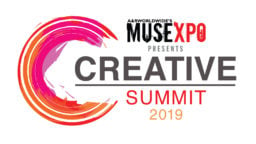Capitol Records UK co-Presidents, Nick Raphael (pictured left) and Jo Charrington (pictured right) gave a live interview on stage yesterday (March 25) with music industry critic and analyst Bob Lefsetz as part of an exclusive keynote A&R conversation at MUSEXPO Creative Summit in Burbank, Los Angeles on the north side of the Hollywood Hills.
Topics discussed during the interview included working with artists, the role that managers play in a successful artist’s career, sexism in the music industry, and what they look for in a new signing in 2019.
MUSEXPO Creative Summit takes place this week from March 24–27 as part of the inaugural California Entertainment Week, which also includes the annual Worldwide Radio Summit.
You can read an abridged version of Jo Charrington & Nick Raphael’s on-stage interview below:
I’m just going to dive right into it. single or album?
Nick Raphael: Interesting question. As a music fan, I’ve always loved an album, being very disappointed over the years with the quality of the albums of some of the acts I loved.
So you go and hear a song and be stupidly excited, at about seven, eight, nine, 10-years old, go to Our Price the big record store and get there buy the album and find out there’s only one other good song on the album.
Contrary to that, great albums – Marvin Gaye, What’s Going On, Carole King’s Tapestry [I] love, love, love, love, [and] changed my life; Depeche Mode Violator changed my life. And we have artists who we have signed who care about their album, but if you have no good singles on it, the public will not buy your album.
And in this modern age, you can create bodies of work, but you may release it in a slightly different way to the way you released it 20-25 years ago.
I was sent an email with an article like from The Guardian or whatever and talking specifically about this subject. You know, we have Ariana Grande who’s putting out product on a regular basis, if we go on Spotify we look at the plays, on almost every album as you go down the album the plays reduce it, which would indicate that people are not listening to the whole album…
Jo Charrington: It’s important to the artist though and what’s changed for us now is the album is the end of the campaign and not the beginning. So we release the singles before the album, once the album’s out, it’s done and we move on to the next.
NR: I would add to that, that the greatest album by most artists is their Greatest Hits and always has been.
You two work together. Tell me how that works.
JC: It works most of the time.
Okay when it doesn’t work, does it not work because of creative issues or different personalities or business issues?
JC: I think what makes it work is that we’re very honest with each other and we say things that no one else would dare to say to the other person.
I think it’s what kind of kept us going and hopefully [we’re] good at what we do and we challenge each other. When you challenge people sometimes you fall out. And sometimes we fall out for a little while. But we’re not scared of it and it’s quite enjoyable.
“A really important part of a creative relationship is to be able to be honest and sometimes that’s being kind and saying good stuff and, Wow, that’s a great idea. Let’s do it. And sometimes it’s, What are you thinking, that’s terrible.”
Jo Charrington
It’s almost like sport sometimes. A really important part of a creative relationship is to be able to be honest and sometimes that’s being kind and saying good stuff and, Wow, that’s a great idea. Let’s do it. And sometimes it’s, What are you thinking, that’s terrible.
Let’s stay on the point of honesty. If someone sends you a demo and you don’t think it’s of the right quality are you honest then?
JC: It probably depends on who I’m having to be honest with, and how well I know them and if I want to be in business with them again. Sometimes it will be a straight pass. Nope, not interested. If it’s somebody I don’t know and I have no relationship with and I’m busy, but I will give them an answer.
If it’s somebody that I have a history with and Iv’e worked with before, they will get a more detailed reason for why it’s not right for us. It will always be polite and always be kind.
Sometimes, something that we don’t like or we don’t get doesn’t mean it’s not great. It just doesn’t doesn’t make us feel what it might make someone else feel.
NR: It’s changed with age. When I was first in the business, I was the biggest prick in the business. The reality is that as I’ve got older, [I’ve] hopefully [got] a little more aware of other people’s feelings. There are things you can do.
“When I was first in the business, I was the biggest prick in the business. The reality is that as I’ve got older, [I’ve] hopefully [got] a little more aware of other people’s feelings. I think you have to play it forward in this business. You don’t have to tell [artists] you like it when you don’t, but you have to be sympathetic to them.”
Nick Raphael
One of the greatest A&R men of all time is sat in the audience, Seymour Stein and he could give me a lesson or two and Jo a lesson or two on what we should and shouldn’t do, but what I have learned over the years is the fact that if you go to a show and it’s terrible and someone’s invited you, don’t walk out after one number, because that’s just rude and one day that manager or that artist might do something.
And we’ve learned the positivity of do right by artist, and I’m happy to tell you a quick anecdote that is really interesting.
When we went to sign Sam Smith, he had a gentleman who used to work with him called Elvin Smith who is not a relation and who’s one of the original people involved in Sam, one of the original managers. Sam asked him, ‘Are Nick and Jo what they seem to be like? I really like them I get a good feeling from them. But I’ve only met them two or three times.’
He said the only way to find out to find another artist that worked them and I know Paloma Faith. Jo had signed Paloma Faith to us and we had worked with her both as a record company and as a publisher and I was told by Elven that he called Paloma and said, ‘What’s Nick and Jo like?’ And she said, ‘They’re like my music mum and dad.’
And he told that to Sam and Sam signed to us which was obviously incredible. I think you have to pay it forward in this business. You don’t have to tell [artists] you like it when you don’t, but you have to be sympathetic to them. They have put all their money, time and effort into it and just because you don’t like it, as Jo says, doesn’t mean it won’t be successful. It just doesn’t work for you.
A lot of people want criticism. They say, tell me how to make it better. then, are you honest, because they really don’t want criticism and if you’re honest, they go bezerk..
JC: If they’re our artist, then we’ll be honest but we’ll [phrase] it in a way that doesn’t make them feel like shit about it. [Raphael is] pretty good at that.
NR: I’ve had to learn that. I’ve learned over the years that great producers… make the person in the room feel like they’re the most important person and they convince them to do things that they wouldn’t want to do.
That person has a way about them, that says, I really liked that idea you had earlier and the person doesn’t even remember it wasn’t their idea, it was the producer’s idea all along, and they eventually convinced them to do something which is the best thing for the record. They do it in such a human [way] and a loving [way] and they listen to the words that the other person says and they throw their words back at them and they are very clever and very astute.
“Sometimes an artist comes with great ideas, and [they’ve] thrown it away and someone else has to literally find it from the back of the couch and bring it back out and say, No, that was a good idea. And that could be the difference between a career or not career.”
Nick Raphael
And sometimes they’re not the technical guy and not the musical guy, but…they can make something happen in the room and you go, Wow, How did they do that? And they have just got this brilliant skill have got this brilliant way with people.
At the end the day we work in a people business and you’re trying to bring the best out of someone and most artists, at the same time as being quite narcissistic in some ways, and obviously that’s how they get on stage and behind the mic, they also have this utter fear and utter sense of imposter illusion, even greater than any of us.
I’ve got an imposter problem all the time. You sometimes say, someone wants to talk to me? I’m still in charge of a record label after all these years? Does someone not know that I have all these insecurities but for an artist it’s a million times greater. Social media makes it even worse. So you have to appreciate that and [have] someone who can make that person feel great in that moment and convince them to do something in that moment that’s potentially in their best interest, but to make them do it in a way that the artist feel like they own it and they feel it and it is theirs.
Sometimes an artist comes with great ideas, and [they’ve] thrown it away and someone else has to literally find it from the back of the couch and bring it back out and say, No, that was a good idea. And that could be the difference between a career or not career.
JC: Also, sometimes you don’t need to criticize. It’s not [always] necessary in that moment. You can just leave it, let it go. It probably won’t come back. That’s something that we’ve learned recently. There’s no point in having an argument and falling out over something that isn’t really important at that moment. Leave it and let the dust settle.
What is it like being a very successful woman in the music business?
JC: It’s all I know.
We’ve been living over the last 18 months with the Me Too movement and it’s even infected the music business. Have you felt sexism? And have you felt kept back in the music business at all?
JC: I started in the music business over 20 years ago and I started in a very male [dominated] environment at London Records as an assistant. So my first experience in record labels was the kind of archetypal male marketing meeting, A&R men.
I think there was like one woman in marketing and some very some great women actually in the press and promotions department. What I learned in that room was to be assertive and to be pushy and if I wanted to get my point across I had to know I was talking about and be well prepared.
I didn’t feel any sexism. But I was definitely a very male environment. I learned quickly how to get what I wanted within that environment by being as good as I could be at what I was doing at that moment in time. I’ve had annoying people – a lot of promo guys over the years, who are kind of cheesy and you just ignore it. It doesn’t happen anymore, but did happen.
When Nick tried to hire me, I think they tried to talk him out [of it] many times.
I managed a very successful band. Had six Top 10 hits and two platinum albums and they couldn’t understand why he wanted to hire a woman to be Head of A&R.
“Overall, in record companies, from what I can tell, there are loads of great women. But There are still not enough women in the senior, senior positions. There’s definitely still not enough women in A&R.”
Jo Charrington
A man in that position, it wouldn’t have been questioned, I don’t think. But I don’t think that would happen now, so definitely that kind of sexism has changed.
Overall in record companies from what I can tell, there are loads of great women. But there are still not enough women in the senior, senior positions. There’s definitely still not enough women in A&R. There are more, there were about two before. There are maybe about five now. I’m talking about the UK.
There’s a lot of work to be done, but I have never had a horrible experience that kind of made me want to leave the industry.
When you’re standing in the vicinity of each other, do you find that people will talk to Nick first because he’s the male?
JC: A lot less so now but they did for years and I’ve been lucky to work with Nick because he always would say, ‘No you’ve got to speak to Jo, you’ve got speak to Jo.’ Eventually people gave up.
Now. I’ve done twice as much as a guy would have had to do to get the respect that I now get, but I couldn’t have done it without him at that time. So I think, hopefully that isn’t the case for women now in A&R, but it does still happen doesn’t it? There are certainly people who would still rather talk to [Raphael] than me.
NR: I have stupid emails sometimes and I’m like, you’ve known us all these years. Like certain people will send me songs and I’ll say Jo has made the records almost exclusively since we started in the London / Capitol era, in 2011 when we came to Universal.
I’ll send a note and it’ll be slightly stroppy and copy Jo in saying, ‘Hey, dude, I don’t say that, but I’m taking the person’s name out. Jo has made the records since 2011. Please send her the song. If it’s great, I’m sure we’ll both be calling you.’
I have to sometimes deflect There are some people that came from a different era and can’t get their head round. I was very insistent Jo became the Co-President the company because I thought that was a real statement. A statement of her success.
The other thing was, it’s a defensive, statement and I don’t care saying this out loud. I didn’t want her to get nicked by someone else to be their President. I [made] sure she gets paid better than all the other guys and second of all make sure she has a title equal to the other guys, which she fucking deserves and I have no shame in saying that and I’ve never looked upon Jo once as a woman. I looked upon her as the best person to do the job.
How important is the manager when you decide [to work with an artist?]
NR: One hundred percent. Can I bring up a mutual friend, Richard Griffiths? We love Richard. We’ve had a 100% success rate with him which is just unprecedented with a manager ever. Second of all is I’ve said this to Jo a million times. I have like a stupid rule even Jo says you need to be willing to break all your rules. If Adele walked in tomorrow and if Adele Sam Smith and Ed Sheeran walked in tomorrow with the wrong manager, everyone one of those acts – they would fail.
A reason they all succeed is because they’ve got good managers. It’s so important that when we meet the manager and I think I could not be in the room with this person for the next 18 minutes, let alone the next 18 months when you’re finding out if you can get to a point where your artist can have a career, then you have to make a hard decision, however talented they are to sometimes walk away.
To give you an example in Sam Smith’s managers, they were looking for an office at the time when they signed Sam Smith to us, and I said to them we’ve got some free desks in our office. They said what about meetings by other artists that aren’t signed to you or aren’t even signed to Universal.
And I said, Not an issue. You can use the meeting spaces. If you need it three o’clock on a Thursday just tell us in advance, you can have it and the guys moved in for two and a half years . It was the most pivotal thing.
Richard Griffiths’s digital people during the period when we launched 5 Seconds of Summer, would base themselves in our office because digital was so important to 5 Seconds of Summer. Richard has taken meetings over the years in our office about other artists because we had an independent office of Universal, and our office between Universal and Sony.
“You don’t need a manager who’s got experience, you got need a manager who people get on with, who listens.”
Nick Raphael
I remember Richard having meetings in our office over the years and I actively helped him and encouraged because we want a great relationship with him. He’s been a mentor to us, he’s been a tormentor to us. He’s the greatest supporter of his artists, but I think he’s one of the greatest managers of modern times.
And he drives me fucking mad as Jo teasingly said at the beginning, but him and Harry [Magee] and Will [Bloomfield] and the whole crew over there are brilliant. Managers are intrinsically important.
If you’re an artist in this audience now and you think your manager is a douchebag – get rid of them, because the bottom line is if you think they’re a douchebag, you wait til the record company meets them.
You don’t need a manager who’s got experience, you got need a manager who people get on with, who listens. Because if your manager doesn’t listen and has no previous knowledge. I have had really experienced managers come to our office and say to us, How did you do that, what did you do about that?
And we tell them. We share information because I also expect them to share information back. Great artists have great managers. They normally don’t come without great managers.
What are you looking for in an act today?
JC: It’s the basic, classic things. Great voice, great talent, great songs, drive, passion some sort of connection with them, a connection with their music. I don’t really know exactly what I’m looking for until I see it or hear it or meet them. Sometimes you might hear something, watch a video and then meet the artist but just not not get on with them and not click.
Chemistry with the artist is hugely hugely important, but at the kind of basic level it’s voice, talent and vision, what do they stand for and can we can we help them fulfil their ambition and who they want to be. Can we do a good job? Can we add value?
“Chemistry with the artist is hugely important, but at the kind of basic level, it’s voice, talent and vision, what do they stand for and can we can we help them fulfil their ambition and who they want to be? Can we do a good job? Can we add value?
Jo Charrington
NR: Likability. If you meet someone with the most talent in the world and they’re not likeable, the public aren’t going to like them and we’ve seen artists come in and you go, they’re just not likeable and it doesn’t matter. Sam is great and the 5 Seconds of Summer boys are great and they are charismatic and warm in the room and the audience obviously like them from day one, but I remember meeting Jay-Z for the first time in 1996.
And even though Damon [Dash] was a very good manager, [he] was a difficult manager and he wasn’t likeable. But Jay, from day one, Shawn as his real name is, was one of the most likeable [artists] and asked you a million questions. I mean, I was exhausted after lunch or breakfast with him.
JC: Out of the artists that we’ve signed together Sam Smith is without doubt the most likeable person. He really is.
NR: And he is the most successful.
When you sign an act do you think about their International potential?
JC: Yes, we definitely do now more than we did when we were younger. We were frustrated where we were before at Sony, because we were having such success in the UK and none of it was translating it overseas. And that was a big reason for us to move to Universal 10 years ago. And since then we’ve been way more focused on acts that have global potential and I don’t know if it was just that we got a bit better or Universal were better at helping us.
“We were frustrated where we were before at Sony, because we were having such success in the UK and none of it was translating it overseas. And that was a big reason for us to move to Universal 10 years ago.”
Jo Charrington
NR: At Universal, Lucian [Grainge] promised us for years, when he tried to hire us when he was head of the UK company, then became head of global company and David [Joseph] likewise said, ‘You come here, we will sell your records around the world, that’s our promise.’
All of a sudden we found the power of, ‘We are backing you and we’re backing you globally. And by the way, now that we suddenly hit the era of streaming and Spotify and Apple being global platforms, my God, you need that. You need that times 10.
Music Business Worldwide





